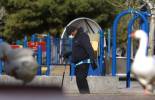Free HIV tests offered on World AIDS Day Monday
In the wake of a new report that the majority of people with HIV fail to properly control their condition, the Southern Nevada Health District will offer free HIV testing Monday at two Las Vegas locations.
Seventy percent of people with HIV in the United States do not manage their illness properly, adding to the risk of infecting others, officials with the U.S. Centers for Disease Control and Prevention said last week.
Less than a third of the HIV-positive U.S. population has the virus under control through effective care and treatment, CDC Director Dr. Tom Frieden said at a Tuesday news conference. Treatments improve health, prolong lives and prevent new infections, but too few HIV-positive people are being reached, Frieden said.
“One key to controlling the nation’s HIV epidemic is helping people living with HIV control the virus,” Frieden said. “Treatment is particularly important … because people with HIV who achieve viral suppression aren’t just healthier, they’re also less likely to infect others.”
Controlling HIV improves with age, with 18- to 24-year-olds having the least success at keeping the virus in check, the report found, in part because only 49 percent of HIV-positive people that age have been diagnosed with HIV.
To that end, free HIV testing will be offered in the Las Vegas Valley on Monday, the 27th observance of World AIDS Day. In Clark County since 1992 more than 9,000 patients have been diagnosed with HIV/AIDS, with more than 3,000 deaths from the illness.
The CDC estimates some 1.2 million people are living with HIV in the United States, but only about 85 percent know they have the virus, said Dr. Rosanne Sugay, a clinical physician in the health district’s Sexual Health Clinic. Each new HIV diagnosis in Southern Nevada is reported to public health officials. Patients are provided counseling and partner services to help identify those who have the virus, but don’t know it.
“Part of what we do at the Southern Nevada Health District, and why we conduct partner services, is to find that 15 percent,” Sugay said. “If you didn’t know you have HIV, you can be infecting other people and not know it.”
Like anyone with a chronic health condition, people with HIV are taught to monitor symptoms and manage their condition, but compliance with treatment plans can be challenging. Some of the barriers to compliance for HIV patients include the cost of medication, access to care, social stigma and acceptance by the patient, Sugay said.
Before any treatment plan can begin, however, patients must be identified. Monday’s testing will take place at the Sexual Health Clinic and the Gay &Lesbian Center of Southern Nevada. Other activities Monday at the Gay &Lesbian Center starting at 5:30 p.m. include a panel discussion, an inspirational service, a candlelight vigil and a showing of the film “The Normal Heart,” at 9 p.m.
Free HIV tests are also offered at the health district’s Sexual Health Clinic at 400 Shadow Lane, Suite 106 (Alta Drive and Shadow Lane) from 8 a.m. to 4:30 p.m. Monday.
In addition to the traditional blood test, the health district offers two types of rapid HIV tests providing same-day results. All HIV testing at the health district is confidential. In addition to testing, the health district conducts community outreach and referrals.
There is no cure for AIDS and no vaccine against HIV, but treatment can manage symptoms, improve quality of life and lengthen a patient’s life even after the development of symptoms, according to the National Institutes of Health. A combination of drugs provides so-called antiretroviral therapy, which suppresses replication of the virus and reduces HIV in the bloodstream. By preventing the virus from reproducing, the patient’s immune system has time to recover from the HIV infection.
People receiving treatment still can transmit the virus to others through sex or by sharing needles. HIV can become resistant to some antiretroviral therapy, an occurrence most true in patients who do not take their medication on schedule.
The first cases of AIDS were reported in June 1981. Today, an estimated 35 million people worldwide are living with HIV. Although AIDS-related deaths have fallen by 35 percent since 2005, an estimated 1.5 million people died from AIDS in 2013, according to the CDC.
Global efforts have resulted in some 11.7 million people in low-income and middle-income countries receiving antiretroviral therapy for HIV infection in 2013, nearly 2 million more than in 2012.
In the United States, nearly 648,500 people diagnosed with AIDS have died since the first cases were reported, and approximately 50,000 people become infected with HIV each year. An estimated 1.2 million people in the United States are living with HIV.
Contact Steven Moore at 702-380-4563 or smoore@reviewjournal.com.
Commemorating World AIDS Day
The health district’s Sexual Health Clinic will offer free rapid HIV testing at the following locations Monday:
Sexual Health Clinic, 8 a.m.-4:30 p.m., 400 Shadow Lane, Ste. 106
Gay & Lesbian Center of Southern Nevada, 10:30 a.m.-12:30 p.m./1:30 p.m.-5 p.m., 401 S. Maryland Parkway.























